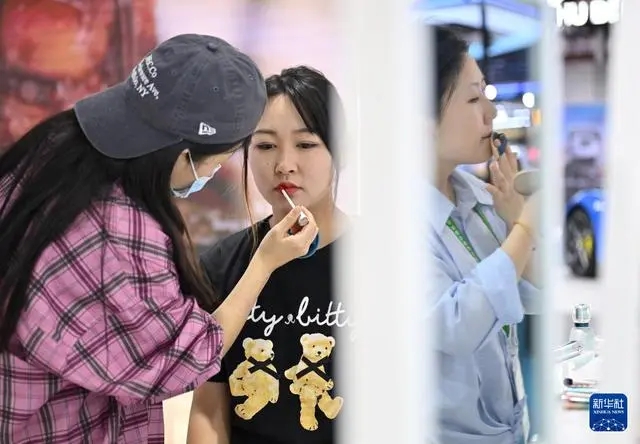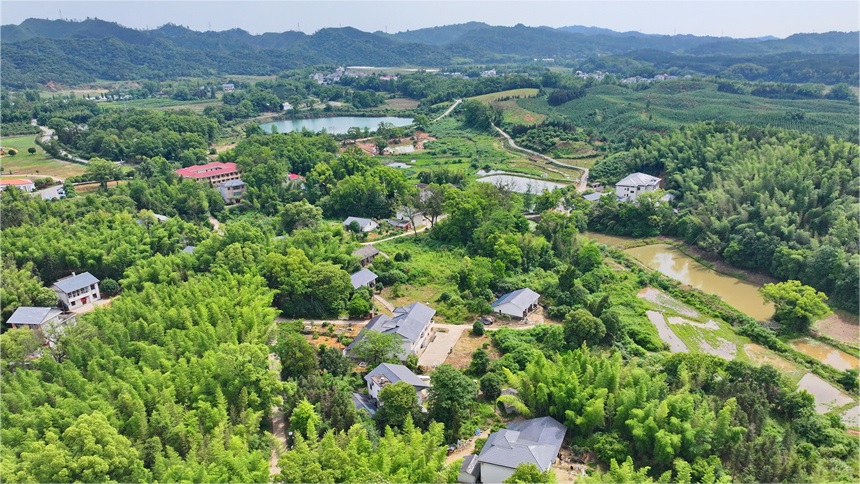Domestic beauty brands capture broad market

Visitors try out beauty products during the fourth China International Consumer Products Expo in Haikou, capital city of south China's Hainan Province. (Photo/Xinhua)
In recent years, domestic cosmetics brands have rapidly gained popularity among consumers.
According to data from the National Bureau of Statistics (NBS), China's retail sales of cosmetics products reached 414.2 billion yuan ($57.24 billion) in 2023, up 5.1 percent year on year.
Freda is a cosmetics company located in Jinan, east China's Shandong Province. The company has 35 production lines, with annual output value exceeding 4 billion yuan.
"We must carry out technological upgrading, ramp up research and development (R&D) efforts, and improve product quality to maintain competitive in the market," said Gao Chunming, general manager of the company.
"In recent years, with government support, we have implemented intelligent production and digital management, effectively ensuring product quality," Gao added.
Gao explained that the company has more than 100 R&D staff members, and has formed long-term and stable partnerships with universities like Shandong University and Beijing Technology and Business University.
In 2022, the company inaugurated its R&D and innovation center, which comprises different functional sections, including cosmetics research, medical equipment research, and raw material research.
Baiyun district in Guangzhou, south China's Guangdong Province, is one of the major hubs for the cosmetics industry in China, boasting nearly 1,300 cosmetics companies. These account for about one-fourth of the national total and half of Guangdong Province.
In the workshop of Guangzhou ShiFei Bio-tech Co., Ltd., located in Baiyun district, automated equipment ran non-stop, with a digital screen showing the progress of different production stages such as material preparation, weighing, emulsification, and packaging.
"The workshop ensures strict environmental control, encompassing air cleanliness, humidity, temperature, airspeed, and lighting, to ensure the quality of the products," said Wang Jiahua, head of the company. Wang explained that the company possesses a testing center equipped with state-of-the-art devices for quality control.
In Daixi township, Wuxing district, Huzhou city, east China's Zhejiang Province, innovative marketing strategies have contributed to a surge in the demand for beauty products.
In recent years, Daixi township has developed into a thriving beauty and cosmetics hub. It has attracted 281 cosmetics and related companies, making it one of the most concentrated beauty platforms in the country. Last year, Daixi township welcomed over 2 million tourist visits.
During last year's mid-year shopping spree, known as the "618" shopping festival, Proya, a beauty brand with a branch in the township, achieved impressive sales on platforms such as Tmall, Douyin, and JD.com.
In 2023, exports of the township's cosmetics enterprises grew by 220.5 percent year on year, with some products being sold in over 70 countries and regions.
Photos
Related Stories
- Trending in China | Natural beauty methods in Xinjiang: Usma grass
- Chinese cosmetics take Southeast Asian beauty economy by storm
- Chinese cosmetics gain popularity overseas
- Chinese market key to continued growth of Spanish beauty firms, manager says
- World's earliest synthetic white lead cosmetics found in China's Shaanxi
Copyright © 2024 People's Daily Online. All Rights Reserved.









